HISTORY
Our Story
GHE has pioneered a legacy of empowering remote Himalayan villages. By blending adventurous expeditions with energy access projects, we drove sustainable development and uplifted isolated communities through innovative, on-ground technological solutions.

Global Himalayan Expedition (GHE) was founded by Paras Loomba in 2013 with a mission to bring energy access to remote Himalayan villages through conducting impact expeditions.
The inspiration for GHE came from Paras’s participation in the 2012 International Antarctic Expedition, where he returned with a vision to create positive change for off-grid communities.
Till 2015, GHE had electrified numerous off-grid Himalayan villages and started expanding its impact by promoting sustainable tourism.
In 2016, Jaideep Bansal joined GHE, having initially participated in the 2013 expedition and subsequently leading teams until 2015. Jaideep’s dedication to GHE’s mission led to the formation of global partnerships through the World Economic Forum, further amplifying the organization’s reach and impact.
Today, Paras and Jaideep, along with their passionate team, continue to drive holistic development in rural villages. Their journey exemplifies the power of vision, passion, and relentless commitment to making a lasting impact.
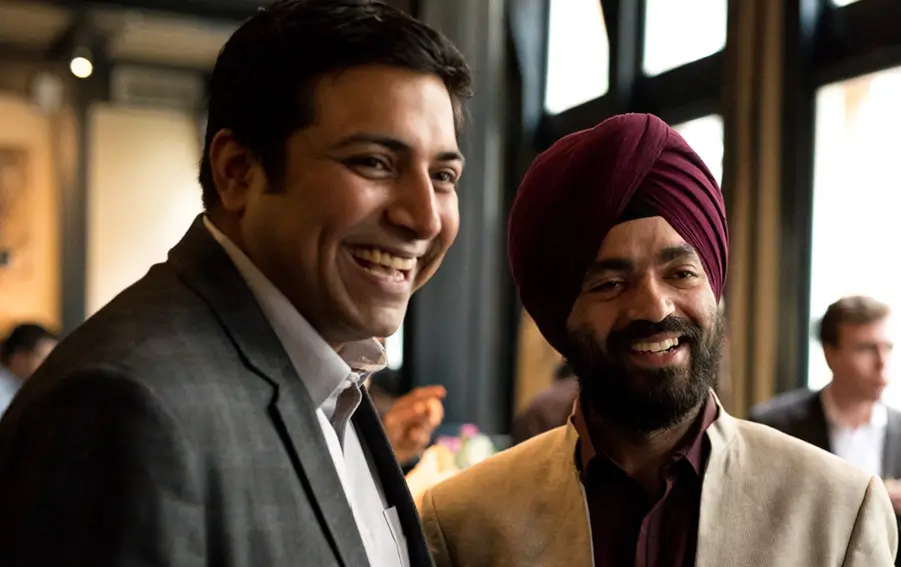
OUR EVOLUTION
OVER THE YEARS
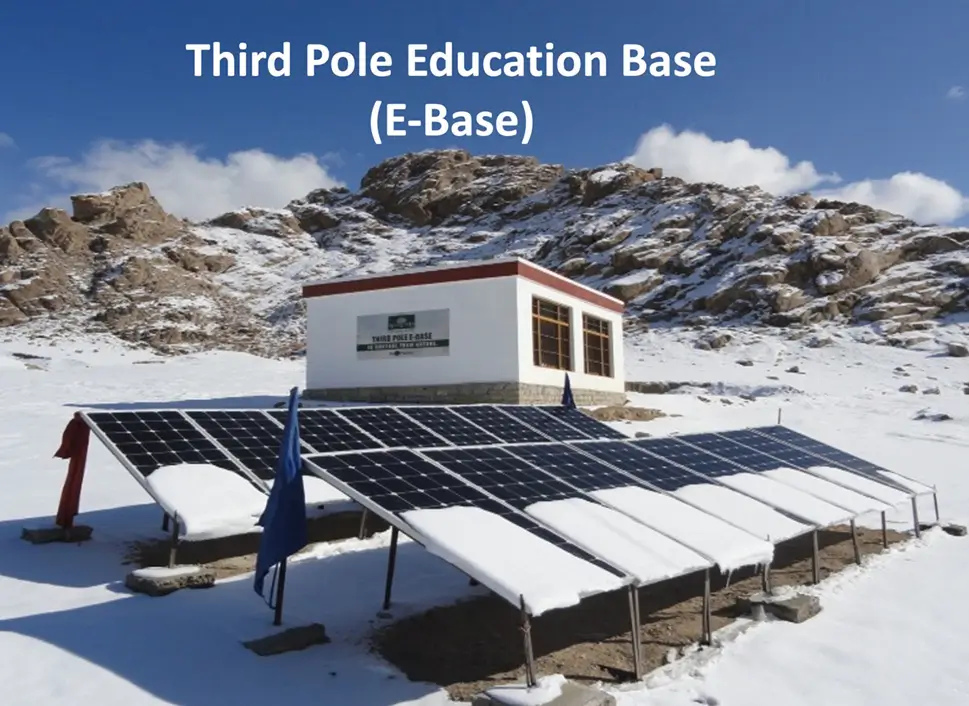
Setup of Third Pole Education Base in Ladakh
In 2013, GHE was launched when 19 travelers from 13 countries came together in Leh, Ladakh to set up an Education Base powered by solar energy. Constructed with locally sourced materials and designed with passive solar architecture, the Third Pole Education Base played a crucial role in offering the 200 students of Mahabodhi School in Leh an opportunity to engage in experiential education and learn about climate change.
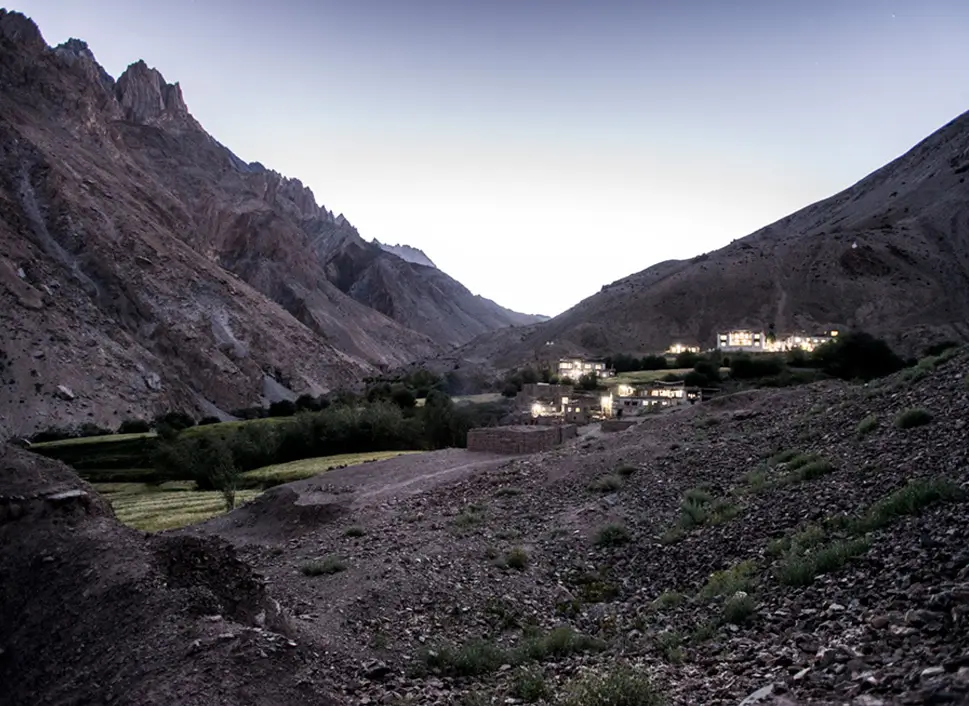
First Village Electrified - DC Solar Microgrids
Building on the success of the first expedition, which established a solar-powered educational base, the next logical step was to provide energy access to remote off-grid villages in Ladakh that still relied on fossil fuels for lighting. A self-designed DC microgrid, installed by travelers from 12 different countries, demonstrated the power of tourism as a force for good.

IEEE Smart Village Partnership
n 2015, GHE established its first partnership for the Himalayan Electrification Project with IEEE Smart Village. A chance meeting with the founders of IEEE SV in Mumbai sparked a decade-long collaboration. This partnership has since evolved to include the electrification of remote Himalayan villages and monasteries, as well as the development of pilot models for digital labs in schools.

CSR Partnership
Building on the successful partnership with IEEE, GHE secured its first CSR partner, Welspun. This collaboration not only provided funding for the electrification of remote villages but also involved sending Welspun employees to Ladakh to experience hands-on leadership in the field.

Power Africa Zambia
In 2016, GHE was invited to Livingstone, Zambia, to share its experiences with the emerging IEEE African Entrepreneurs community on establishing sustainable models of rural electrification. The conference also provided an opportunity to form partnerships with fellow energy access startups seeking solutions and support to scale their models on the ground.

National Geographic Documentary
National geographic shot a documentary on GHE as part of their Breakthrough Series – Season 2. The Documentary focussed on importance of Decentralised solar grids as a means to bring power to the remote communities of the world. The documentary has been viewed by millions of people across more than 100 countries in the globe and is currently running on Disney Hotsar as well.

GE Power - GHE Global Partnership
GE Power entered into a partnership to solar power 10 villages in Ladakh through the implementation of solar microgrids. This global collaboration also included the participation of GE senior leadership in these electrification expeditions as part of their Accelerated Leadership Program.

Women’s Leader Expedition
Following the success of Corporate Expeditions with GE, GHE also launched its first Women Leader Expedition which featured senior women leaders from the corporate sector coming together from several locations across the globe. As part of the expedition, the women leaders brought solar energy to a remote monastery run by the local Ladakhi nuns.
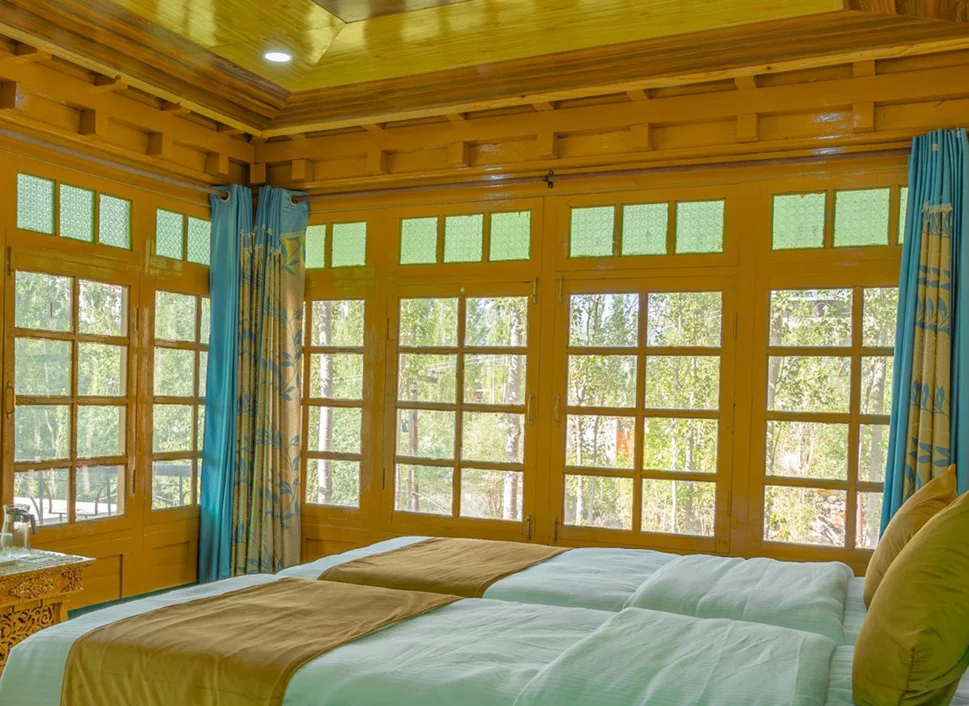
Eco Homestays Setup In Ladakh
To create sustainability in the model of GHE, the villages that were being developed through Solar Power were taken a step further in terms of developing these remote villages as sustainable tourism destinations through the setup of Eco Homestays under the Mountain Homestays initiative.
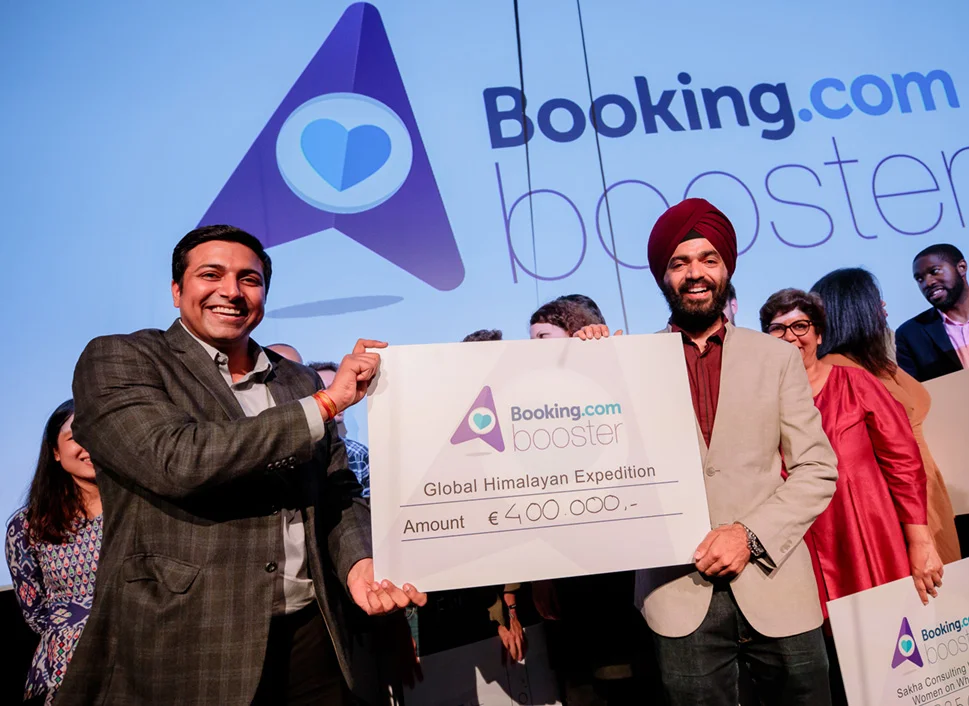
Booking Booster Award
In 2018, GHE was selected as one of the top 10 sustainable tourism start-ups to be part of the Booking.com booster program. The team spent 2 weeks with experts and other startups at the booking.com office and was able to win a grant funding to accelerate its work on developing the impact tourism agenda.
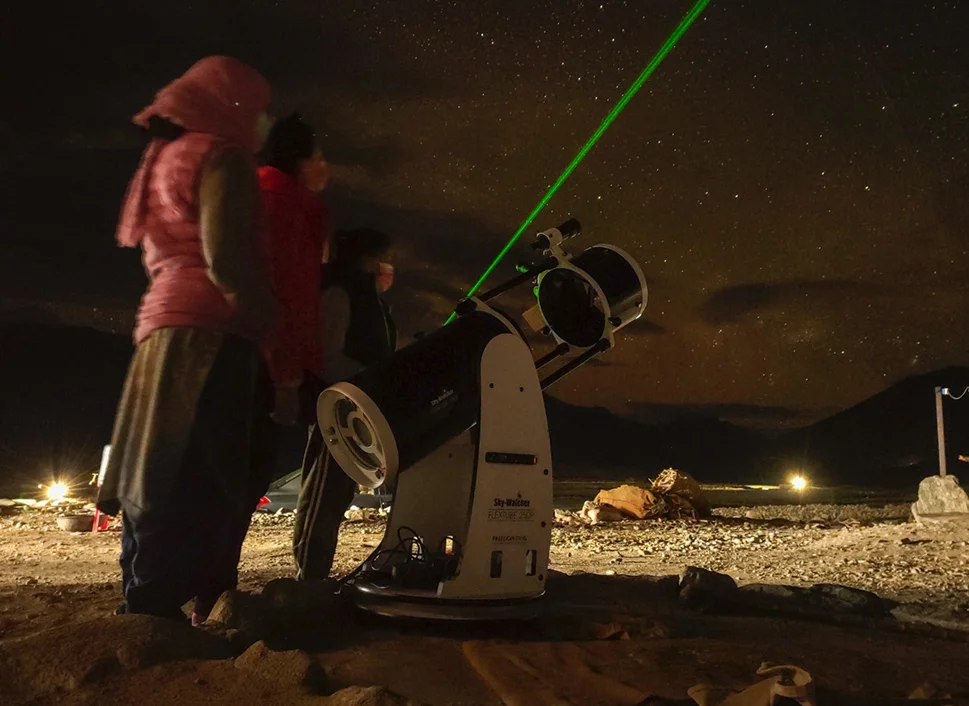
Astrostays Launched
To promote livelihoods in villages where eco-homestays have been established and to leverage the dark skies of the Himalayas, GHE launched the Astrostays initiative. This program engages the local community in providing stargazing and astronomy sessions for travellers visiting Ladakh, offering unique experiences at the homestays.
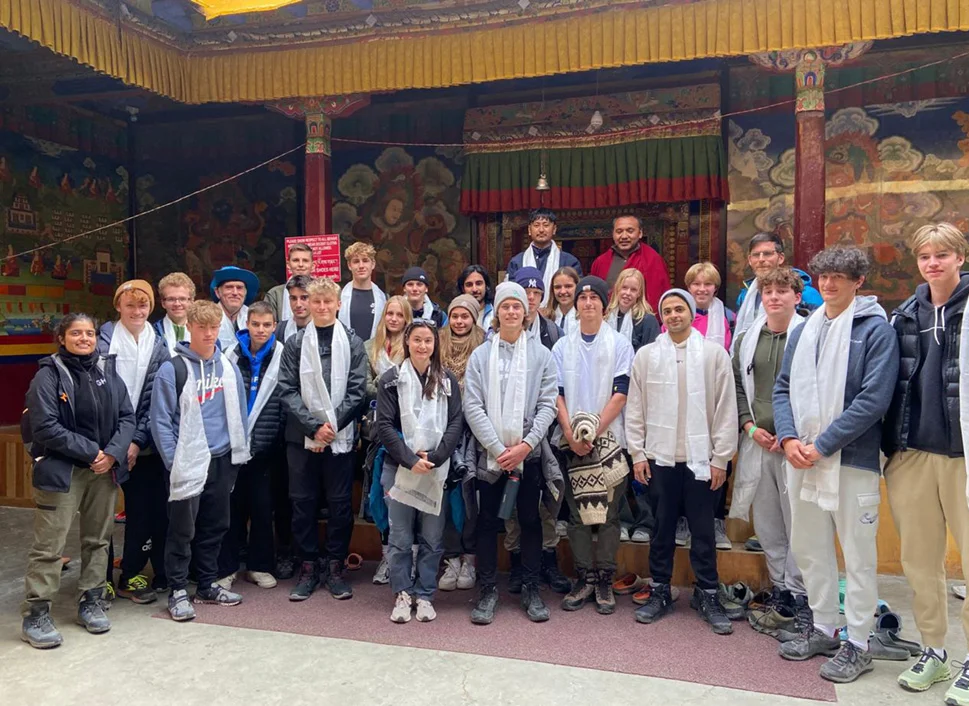
Student Expeditions Launched
In 2019, GHE launched student expeditions that involved schools partnering with GHE as part of their CAS Programs. The students along with the faculty travelled to remote Himalayan villages to implement sustainability projects around clean energy to positively impact the communities and achieve the UN SDG Goals

UNFCCC Award at COP 26
In 2020, GHE received the prestigious UNFCCC Climate Action Award for its innovative approach to financing climate change mitigation through tourism. This recognition marked a proud moment for GHE, as it became the first tourism operator to win the award. Additionally, GHE was given the opportunity to showcase its on-ground climate action initiatives at COP 26 in Glasgow.

Health Centre Setup - Meghalaya
During the COVID crisis, GHE undertook the task to strengthen the local health centres in the Northeast part of India. The health centres were upgraded with Solar Power to ensure 24*7 access to energy along with critical medical care equipment to provide the local communities with modern health facilities.

First Digital Education Centre
In order to bridge the educational divide for the students in the remote rural regions, GHE began to leverage digital education tools through the setup of Solar Powered computer labs along with offline experiential and educational content. This digital transformation enabled students to access information beyond what was being offered to them.

Microgrid Award
For its efforts in enhancing primary health center facilities in remote villages of Ladakh and Meghalaya through the installation of rooftop solar power systems and critical medical equipment, GHE was honored with the Microgrid Greater Good Award in Pennsylvania.

Partner Expeditions Launched
For the first time, GHE collaborated with a tour operator to organize an expedition for a group of trekkers from Austria. These partner expeditions enabled GHE to expand outreach for its impact expeditions through various other tour operators specializing in adventure and responsible tourism.

Nepal Solar Electrification
In 2023, GHE expanded beyond India by successfully commissioning an 11KW solar plant for a school in Nepal with limited access to grid electricity. Completed with the support of a local Nepali partner, this project marked a significant step in GHE’s expansion into international energy access initiatives.

ATOAI Award
In December 2023, GHE received the Sustainability Champions Award from the Adventure Tour Operators Association of India. This accolade recognized GHE’s efforts in sustainability and community development, highlighting its role in advancing adventure tourism in the country.

Cookstoves Initiative Launched
In order to accelerate its environmental impact and expand its outreach, GHE began to work with the private sector to enable the transition to net zero by enabling the communities to transition to clean cooking solutions, thereby enabling a 60% reduction in carbon emissions from the household using traditional cooking solutions and bio-mass.

MOU with Ministry of Tourism, Govt. of India
To advance sustainable rural tourism in India’s frontier villages, GHE signed an MOU with the Ministry of Tourism, Government of India. This agreement aims to develop blueprints and models to transform these remote villages into potential destinations for travellers seeking offbeat getaways.

GHE Foundation Launched
GHE Foundation, launched in 2025, is a not-for-profit organization working to advance sustainable development and inclusive livelihoods in rural and remote India. Building on GHE’s expertise in clean energy, climate action and community-led tourism, it delivers scalable solutions that improve lives while protecting ecosystems. Through strategic partnerships, it creates measurable social, environmental and economic impact.

Restoring Sacred Forests
In partnership with Planeterra, over 30,000 trees were planted across degraded lands, homesteads and sacred forests in Umswai. The initiative restored natural habitats, revived sacred groves and strengthened biodiversity. Led by local communities, plantation and monitoring became a shared responsibility, making the forests truly community-owned and sustainable.


